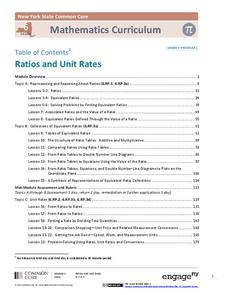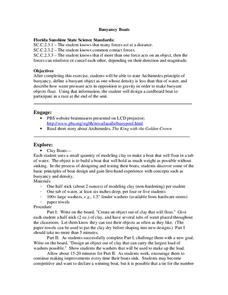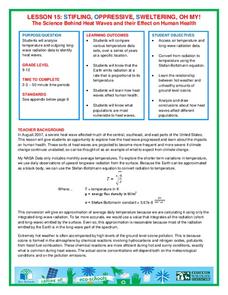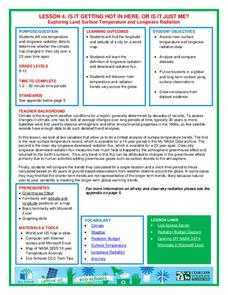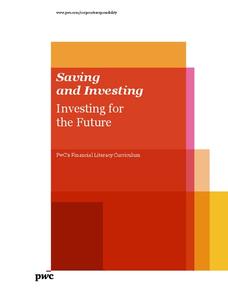Channel Islands Film
Lone Woman of San Nicolas Island: Lesson Plan 1
As a practice writing test, fourth graders use the West of the West's documentary Lone Woman of San Nicolas Island and two print resources as source materials for an informative article that identifies information that is historically...
Curated OER
Word Roots 3: Cern, Jur, Leg Intermediate Fill-in-the-Blanks
This resource includes a word bank, information about specific word roots, and 12 fill-in-the-blank sentences that will help your class acquire vocabulary. This is an online activity that provides instant feedback. Make connections...
Curated OER
Analyzing Literature via Literature Circles
Introduce literature circles with Roland Smith's novels. Your seventh graders will see the activity modeled as you read The Three Little Pigs together and apply the format to a Roland Smith novel of their choice. The lesson includes...
Curated OER
Honor People's Personal Space and Three Ways to Handle Conflict
Students discuss how better behavior can make their school a safer place. Using volunteers, they demonstrate being too close to someone when talking and invading their personal space. Using this example, they identify the three positive...
Curated OER
Word Roots 4: Grad, Mot, Cad Advanced True and False 3
Test your pupils' vocabulary skills with this somewhat unconventional activity. Using context clues and word roots, leaners must decide whether a word is used correctly in a sentence or if it is not. This is a true/false activity; if the...
Curated OER
Real-Life Problems
How much does it cost to mail this letter? Scholars approach the real-life scenario of adding postage as they practice introductory addition. Each letter has a total amount it needs, and learners draw in the appropriately-priced stamps...
Curated OER
Borrowing Narrative Skills from Mr. Fletcher: Using a "Prompts in Reverse" Technique to Inspire Your Writers
Help your class find their writing voices with this lesson plan which uses the work of Ralph Fletcher to guide a "Prompt in Reverse" activity. Using the chapter "First Pen" from Fletcher's Marshfield Dreams, learners decipher what they...
EngageNY
Reading and Taking Notes on Colonial Trades
In the tenth instructional activity of this unit, young scholars learn to categorize information as they continue researching their colonial trade. During guided practice, the teacher models how to read informational text slowly while...
EngageNY
Mid-Unit 2 Assessment: Inferring About the Silversmith Trade in Colonial Times
The seventh lesson plan in this unit on colonial trade assesses fourth graders' ability to use details from an informational text to make inferences and create a piece of informative writing. The included assessment begins with learners...
EngageNY
Solutions of a Linear Equation
Use the distributive property to solve equations. The sixth lesson in a 33-part series has scholars solve equations that need to be transformed into simpler equations first. Class members apply the distributive property to the equations...
EngageNY
End of Unit 2 Assessment: Working with Two Texts - Reading, Listening, Summarizing, and Synthesizing
As a summative assessment for this unit on colonial trade, fourth graders listen to and read informational texts in order to demonstrate their ability to take notes, write summaries, and draw connections. Young scholars first listen as...
EngageNY
Ratios and Unit Rates
This turn-key unit on ratios and unit rates walks through a 30-lesson unit on teaching proportional reasoning, with each lesson broken into detailed teaching notes and time allotments for all parts. An unbelievable resource when taken...
Captain Planet Foundation
Help a Sister Out: Garden Companions
Explore Native American gardening traditions with a instructional activity on companion planting. Based on the concept that certain crops grow better when planted near other specific crops, kids research the gardening method with...
Center for Precollegiate Education and Training
Buoyancy Boats
What did the sea say to the boat? Nothing, it just waved. An inquiry-based instructional activity starts with a simple concept on the Archimedes Principle and challenges pupils to make something out of clay that floats. Then, they design...
NASA
Producers Make Their Own Food
During an inquiry-based activity, scholars decide which variable to test and then design an experiment to determine the needs of producers. After two weeks, they complete a full analysis and research paper.
National Wildlife Federation
Quantifying Land Changes Over Time Using Landsat
"Humans have become a geologic agent comparable to erosion and [volcanic] eruptions ..." Paul J. Crutzen, a Nobel Prize-winning atmospheric chemist. Using Landsat imagery, scholars create a grid showing land use type, such as urban,...
California Academy of Science
What's on a Penny?
As a lesson on scientific observation, have your class investigate the features of a penny and a nickel. Working in pairs, they practice writing detailed descriptions using their senses and a ruler to gather information. This is an...
National Wildlife Federation
Stifling, Oppressive, Sweltering, Oh My!
Looking for a hot date? Pick any day in August, statistically the hottest month in the United States. The 15th lesson in the series of 21 instructs pupils to investigate the August 2007 heat wave through NASA data, daily temperature...
National Wildlife Federation
Green Green Revolution
School budgets don't have a lot of extra money, so when high schoolers propose saving the district money, everyone jumps on board. The first lesson in the series of 21 introduces the concept of an energy audit. Scholars form an...
National Wildlife Federation
Climate Solutions – A Call to Action!
The final lesson in the 21-part series on climate change focuses on energy solutions to the consumption problem. Using data specific to their school, pupils make recommendations, follow up on actions, and carefully track progress....
National Wildlife Federation
Is It Getting Hot in Here, or Is It Just Me?
Currently, only 2.1% of global warming is felt on continents, while over 93% is felt in the oceans. The fourth lesson in the series of 21 on global warming is composed of three activities that build off one another. In the first...
PwC Financial Literacy
Saving and Investing: Investing for the Future
A fine activity on saving and investing is here for you and your middle schoolers. In it, learners explore the values of time and money, and discover how small amounts of money invested over time can grow into a large "pot of gold." They...
National Wildlife Federation
Why All The Wiggling on the Way Up?
Some of the CO2 emitted by burning fossil fuels is removed from the atmosphere by natural sinks, such as the ocean. The fifth engaging lesson in the series of 21 examines the CO2 data from three very different locations. It then makes a...
National Wildlife Federation
When It Rains It Pours More Drought and More Heavy Rainfall
Which is worse — drought or flooding? Neither is helpful to the environment, and both are increasing due to climate change. The 16th lesson in a series of 21 covers the average precipitation trends for two different climates within the...
Other popular searches
- 3rd Grade Lessons
- 3rd Grade Grammar Lessons
- 3rd Grade Lessons Prefixes
- Phonics Lessons Grade 3
- Fluency Lessons Grade 3
- Constitution Lessons Grade 3
- 3rd Grade Math Lessons
- 3rd Grade Lessons Ecosystem
- 3rd Grade Lessons Science
- Economics Lessons 3rd Grade
- 3rd Grade Fraction Lessons
- 3rd Grade Lessons Animals













